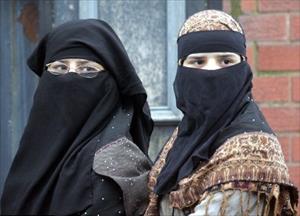(Ahlul Bayt News Agency) - She sat on a corner table of a busy, happening Karachi restaurant. In a greyish cloak-like garb, which in later years would be known as an abaya in Pakistan, she wore a matching triangular head scarf, with one end of it arranged neatly over her face with the help of a pin. All I could see was her eyes. Normal eyes. Not kohl-filled and mesmerizing, unlike all the eyes of women with niqab I had seen on covers of books written about Muslim women who cover their faces. I watched, amused, as she dexterously managed to eat and drink by sneaking in food inside her scarf, somehow, without showing her face.
This was almost two decades ago, my first encounter with a modern urban Pakistani woman who dared and chose to wear an outer cloak, often called the burqa.
Over the passing years, the numbers of emancipated Pakistani women opting to don the more Muslim way of dressing has grown. Myself included. As a journalist, writer and activist, and born in a family where coercion was never the done thing, my opposition, if at all, actually came from family and friends who took time to accept my head-cover. But it has been my choice to don it to whatever degree I do. An expression of my faith as I know it. An act of love to please God. There is no force and no oppression.
Yet, every few days, this "choice” of Muslim women world over, a buzzword, makes news in one way or another. More recently, Lady Gaga decided she must be our voice, in her latest offering "Aura” also known as the "burqa.”
I will not waste words about whether this is another desperate attempt at attention-seeking. Neither does that disturb me. She wants to attract attention? She certainly got mine! Thanks to her, I am irritated, yet again.
My issue with attempts like Gaga and other emancipatory attempts for women in hijab is, to begin with, how the world is obsessed with it. Why is the hijab or burqa a buzz word but not a nun’s head-cover or her right to choose celibacy…. a right I completely respect? Liberality and support of rights to choose cannot be partial. It must then be across the board, for practitioners of all viewpoints, left right and centre, or else it is a farce.
Often, the notion of hijab is over-simplified and Muslim women practicing it (or not) are homogenized. We are all clubbed together. I personally even have a problem using the term "we” actually. We Pakistani Muslim women are so varied, each so unique, that I can’t even speak for all of them, leave alone Muslim women of the world.
Islam is not a monolithic entity. Neither are its followers. There are degrees and levels of hijab even in the Islamic tradition. The way women of Islam have understood and practiced it also differs. When I have donned it, I myself have practiced it as a simple dupatta (Pakistani traditional scarf), a big chaadar (cloak-like sheet) and a scarf pinned tight. My friends who cover their faces have different ways in which they do it. Some wear all black. Others jazz up the black with studs and diamantes. Yet others wear the burqa in colorful varieties. And a lot of my friends, deeply drenched in Islamic faith, do not cover their heads or faces at all.
The reasons women practice hijab are also multi-fold, complicated and different. Cultural conditioning is one, where women just feel more comfortable wearing it because everyone they know does. I know Christian and Hindu women in Pakistan who choose to wear it because they feel at home doing so. Yet other Muslim are indeed oppressed. They are forced and have no choice. That is deeply problematic even to Muslims, because "there is no compulsion in religion” (Quran 2:256).
Yet other Muslim women, myself included, are what are called the "Muslims by choice” — those who were Muslims by birth and chose to start attempting to practice it more consciously. And then there are those who came into the fold of Islam from another faith.
If I know one thing, women practicing hijab (to any degree) would unanimously like to say: We are honestly just as normal or as crazy as the rest of the women of the world. We laugh. We cry. We make mistakes. We are women who earn for their families and we are women who are home-makers, or we are both. We shouldn’t have to smile a little extra to prove to you that we are not prudish or depressed or oppressed. We shouldn’t have to be extra witty in order to show you the brains beneath that covered head. We don’t want to be caricatured as being exotic and sensuous beneath the layers of cloth. We don’t do it to create hype or curiosity.
We are just like you. So please don’t appreciate or admire us. Just let us be.
/106

